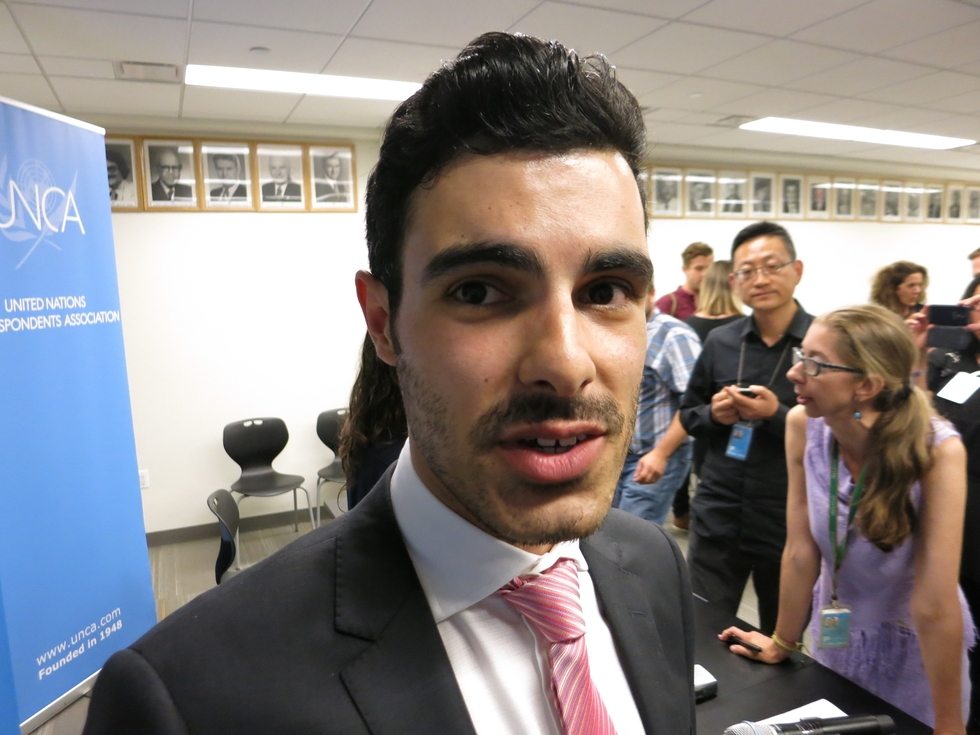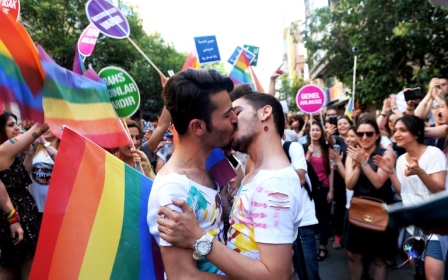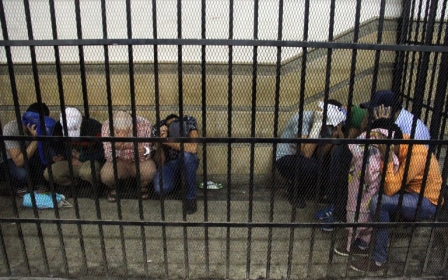Gay Syrian refugee details atrocities at landmark UN meeting

NEW YORK – As soon as Syria’s civil war erupted in 2011, Subhi Nahas, a young gay man from Idlib, saw danger on the horizon.
In one incident, government troops abused him, calling him a “faggot, sissy and other profanities,” he said. When al-Nusra Front, the Syrian branch of al-Qaeda, showed up, tortured an “effeminate man” and promised to cleanse the newly-seized town of "sodomy," he knew he was in trouble.
“I was terrified. I did not move from the house for months. Sometimes I locked the door to sleep. I did not feel safe at all,” he told Middle East Eye.
“I could still hear everything: the gunshots, announcements from mosques. It was so scary that because of the way you walk, the way you talk, you could be killed. They arrested at least three people for being LGBT.
“One of them could tell them that I was part of their group.”
After a few months he escaped to a safe house for LGBT people in Lebanon. He reached the US three months ago, gained asylum protection and lives in San Francisco, where he works for the Organization for Refuge, Asylum and Migration.
On Monday, the dapper 28-year-old made history by recounting his story to the UN Security Council during the body’s first ever meeting on LGBT rights. It focused on gay victims of the Islamic State (IS) group in Iraq and Syria.
After the meeting, Washington’s UN envoy Samantha Power said diplomats were shown “graphic, gut-wrenching” photos of gay people who had fallen foul of the harsh rules imposed by IS, which is also known as ISIS and ISIL.
“We’re getting this issue into the DNA of the UN, but until today the Security Council had never broached this topic and so today represents a small but historic step,” Power told reporters outside the meeting, which was held in the basement of the UN.
But she also acknowledged that council members Chad and Angola had not shown up to the talks and that a meeting in New York without any teeth behind it was unlikely to deter the group’s lead zealot Abu Bakr al-Baghdadi.
“I don’t think anybody thinks that you can convince Baghdadi to be less hateful and less violent to LGBT persons or women or girls or religious minorities - they have to be defeated,” Power said, in reference to a US-led military coalition that still struggles to repel IS forces.
IS, a Sunni extremist group that imposes centuries-old religious rules across swathes of Iraq and Syria, has a grisly track record for punishing members of rival faith groups and alleged heretics with enslavement, crucifixions and beheadings.
The group is also hard on gay people. In a briefing note, the US and Chile, which co-hosted the meeting, said that that IS “has targeted one particular community with seeming impunity and scant international attention: LGBT individuals and those perceived to be LGBT”.
In December, IS posted images online showing militiamen throwing a man off a rooftop and then stoning him to death due to his sexual orientation. Two men were also reportedly stoned to death in Syria the previous month after declaring that they were gay.
Power noted that it was difficult to verify details of attacks against gays in the maelstrom of violence that has ravaged Syria for more than four years and in Iraq for longer still. IS has posted online at least eight visual reports of such killings.
IS 'fuelling' anti-LGBT violence
Jessica Stern, executive director of the International Gay and Lesbian Human Rights Commission (IGLHRC), provided expert testimony during the Arria council meeting – a format for informal talks behind closed doors that typically feature victims and experts from outside the UN.
She said IS has claimed responsibility for at least 30 executions of gay people. “ISIS advertises these killings to give the impression of as many executions as possible and we know that fear of ISIS has actually inspired and fuelled violence against LGBT persons by militias and private actors,” she said.
She praised Jordan, the only Arab nation sitting on the 15-nation council, for criticising IS attacks on gays against a backdrop of laws and hostility against homosexuality across much of the Middle East.
“Jordan’s statement in the Security Council today is the first time in the history of the UN that a member of the Arab group has said something explicitly positive in the context of LGBT rights violations,” Stern told MEE.
IGLHRC has compiled a list of IS atrocities against gay people. It leads with evidence of an incident earlier this month, when three young men from Hama, Syria, being blindfolded and then shot in the head in front of a crowd of locals after being convicted by an IS court.
They had purportedly been punished for “committing acts of the people of Lot [sodomy], spreading corruption on earth, and trying to change the innate nature of Muslims,” according to data from the London-based Syrian Observatory for Human Rights.
A report from the previous month from Fallujah, Iraq, indicates that four men, similarly accused of performing “acts of the people of Lot,” were blindfolded and thrown to their deaths from the top of a four-storey building.
According to the group’s database of atrocities, being hurled from a rooftop is a common punishment for gays under IS rule. Those who are not killed upon impact are sometimes finished off with rocks, according to IGLHRC.
Not confined to IS
Rights groups hailed the first UN Security Council meeting to address LGBT issues as a landmark in global efforts to protect the rights of gay people and other groups – although attendance at the council meeting was not mandatory.
Chad and Angola did not send diplomats. China, Russia, Nigeria and Malaysia attended but did not speak.
While the US and other, mostly Western countries have legalised same-sex marriages and taken other pro-LGBT steps in recent years, Russia, several African countries and others have passed laws to criminalise and deter homosexuality.
In 2013, Russia introduced laws outlawing “homosexual propaganda”. Nigeria and Uganda, where officials similarly speak of asserting “traditional values,” have also passed laws against homosexual behaviour or banned same-sex public displays of affection.
“This is not an issue confined to ISIL,” Power said.
“ISIL has made it common practice, it seems, to target LGBT persons, but that is true also around the world very far from where ISIL dominates. You have countries that criminalise LGBT status and societies that are as unwelcoming as they were 20-30 years ago.”
Middle East Eye propose une couverture et une analyse indépendantes et incomparables du Moyen-Orient, de l’Afrique du Nord et d’autres régions du monde. Pour en savoir plus sur la reprise de ce contenu et les frais qui s’appliquent, veuillez remplir ce formulaire [en anglais]. Pour en savoir plus sur MEE, cliquez ici [en anglais].




